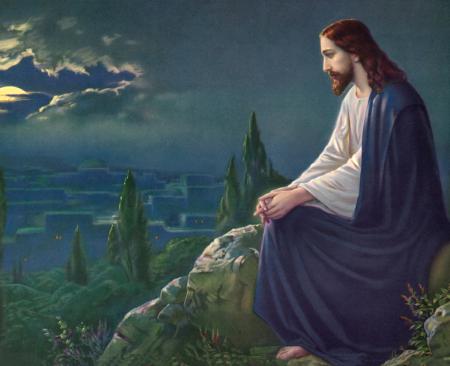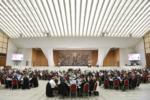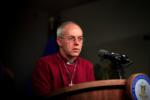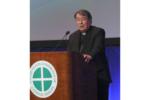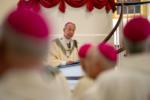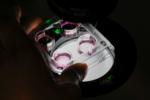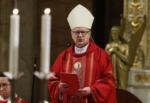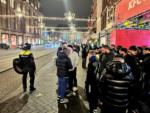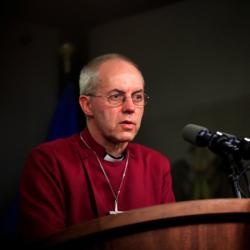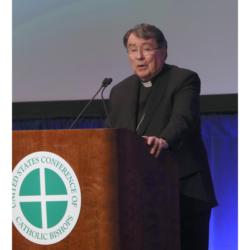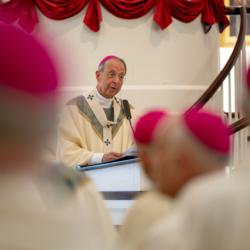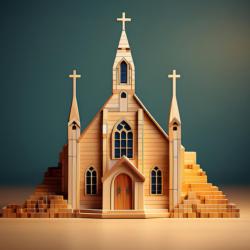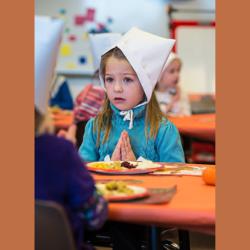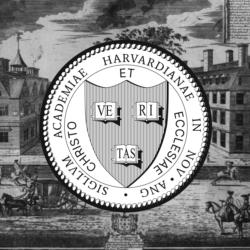Incardination process bolsters archdiocese's multicultural ministry
BRAINTREE -- Father Marcos T. Pena knows how hard it can be for people from other countries to adjust to life in the U.S.
Father Pena is the administrator of St. Lucy and St. Monica in Methuen, two parishes with large communities from the Dominican Republic, El Salvador, Mexico, Puerto Rico, Vietnam, and several African countries. Father Pena himself was born and raised in El Salvador, where he and his six brothers were raised with a strong Catholic faith. He was ordained a priest in the Archdiocese of San Salvador in 2009. The next year, his parents moved to Massachusetts to be with three of Father Pena's brothers who had emigrated there. In 2017, Father Pena's mother was diagnosed with cancer, and he asked his bishop if he could move to the Archdiocese of Boston and be with her. His mother survived, but the COVID-19 pandemic forced Father Pena to stay in Massachusetts. As time went on, Boston became his home.
"I am doing what I am supposed to do in the sense of living my ministry with joy, with enthusiasm," he told The Pilot in a Sept. 18 interview.
This April, Father Pena, 39, was incardinated into the Archdiocese of Boston. He is one of four priests from other dioceses to enter Boston's priesthood in the past year. Typically, one or two priests are incardinated in a year.
"It's a beautiful thing," Archdiocese of Boston Director of Clergy Personnel Father Paul Soper told The Pilot in a Sept. 6 interview. "It's in many ways a thing that extends the welcome of the people of Boston to these priests who have been providing us with assistance in their priestly ministry and their love for us. It's our way of welcoming them into the local family."
Every year, more and more priests from other dioceses are incardinated in Boston. Most come from Spanish- and Portuguese-speaking countries, as well as India and African nations. Many incardinated priests, such as Father Pena, come to the archdiocese to provide pastoral care to immigrant communities.
"It provides us with a base of priests who have experience and language skills and cultural skills in these varieties of ethnic communities," Father Soper said.
The typical process of incardination begins with a priest from one diocese traveling to a diocese in another country. For instance, the Archdiocese of Boston has several priests from Brazilian dioceses serving Boston's large and growing Brazilian community. Sometimes, once a priest is in a new diocese, he decides to stay in that diocese because his ministry is more needed there. The bishop of the priest's current diocese, and the bishop of the diocese he will be incardinated in, must agree that incardination is the right thing to do.
"There's a process of review, lots of interviews, and a fair amount of time watching over this," Father Soper said.
The priest wishing to be incardinated must write a letter requesting it, and both bishops must write letters approving that request. The new diocese meets with the priest to talk about his plans for ministry, and vets the priest by interviewing those who have worked with him.
"We look to see if this is a priest who should be incardinated in Boston now," Father Soper said. "It's a fairly rigorous process and it takes a couple of years."
Once the bishop of the priest's new diocese writes a letter of acceptance, the incardination is official. Typically, there is a Mass celebrating incardination, but incardination does not happen at a Mass like the ordination of priests or bishops. Upon incardination, the priest is a diocesan priest of his new diocese, with all of the rights and responsibilities that accompany it. The incardinated priest is responsible to the new bishop and all of his successors, and those bishops are responsible for him.
Father Pena decided to stay in the Archdiocese of Boston because he enjoys being a priest here.
"It wasn't easy," he said. "It was a decision I took after a year of thinking."
Father Pena enjoyed being a priest in El Salvador, too, but he saw "a great need" for Spanish-speaking priests in Boston.
"I have the experience and the culture to understand them and walk with them in their path of faith," he said. "It's not only about them talking in another language. It's more than that."
When The Pilot spoke to Father Pena, he was at St. Monica's and St. Lucy's for only two weeks. He was still getting to know the various Hispanic communities, which do not yet have an official Spanish-language ministry. When he first came to Massachusetts, he was the parochial vicar of All Saints Parish in Haverhill, which also has a large Hispanic population. There, he saw the challenge for Hispanic immigrants to get involved in their church and their community.
"It is sometimes very difficult for a person who just came from another country to feel at home," he said.
He said that he feels a need to make Hispanic parishioners feel like an integral part of parish life while also preserving their traditional "ways of living the faith." They shouldn't feel like outsiders, but they also shouldn't lose what makes them unique.
"We need to provide for them that sense of identity," he said.
Father Luiz Lopes was incardinated into the Archdiocese of Boston this May. He is currently the pastor of Holy Family Parish in Lowell, where there is a large Portuguese-speaking community.
"I'm happy to become a member of this family," he told The Pilot in a Sept. 17 interview.
Father Lopes, 42, was ordained in the Archdiocese of Aparecida, Brazil, in 2010. Growing up, he said that he, his parents, and four siblings practically lived inside their parish. He felt called to the priesthood during adoration with his parish youth group.
"I felt like my life is different," he said. "Like God called me and asked me something more."
Father Lopes attended a Charismatic Renewal congress in Brazil, and met someone from the U.S. who invited him to come and visit. He first came to the U.S. in 2017. It was his first time outside of Brazil, but he sees few differences between life here and life in his home country. He has found Americans to be very polite people.
"If you are humble, you can adapt anywhere," he said.
He then met Father Michael Harrington, a Boston priest who invited him to minister to the Portuguese and Brazilian communities of St. Anthony Parish in Cambridge. Father Lopes served in that parish for five years, and said it was a "wonderful" experience.
"Over the years, I have to learn a lot about the diversity of the cultures and the people, parishioners from different countries," he said, adding: "I'm happy to help the Archdiocese of Boston on the great and beautiful mission to evangelize."
In Cambridge, much of the Portuguese community was elderly. Father Lopes was responsible for visiting many parishioners who were sick and could not leave the house. He described himself as being "God's presence" in their homes.
"My spiritual life changed a lot, because I had time to listen to people," he said. "I felt like an instrument. I was God's hands in their life."
As he anointed the sick, he remembered his father's advice, hours before his ordination: "Luis, please be merciful. Be compassionate, welcoming to everyone."
"Every day in Lowell, in Cambridge, I try to be God's mercy, God's compassion," Father Lopes said.
He received several calls from Bishop Cristiano Barbosa in 2023, asking him to go to Lowell to work with the Brazilian and Portuguese communities there. After a month of discernment, he accepted. He described Lowell's Portuguese community as being torn between the more traditional older generations and the younger generations who are more likely to speak English and less likely to attend Mass.
"The challenge for me is to help both communities, Portuguese speakers and English speakers, work together," he said.
The Brazilian community, however, is growing rapidly thanks to young families. In 2023, 180 children were enrolled in religious education at Holy Family. The parish doesn't have enough space for that many.
"I call it a good problem," Father Lopes said.
He said that while the children are enrolled in religious education, it is a challenge to keep the parents attending Mass regularly.
"I try to evangelize and motivate the children to bring the parents to church," he said.
He decided to be incardinated into the Archdiocese of Boston because he felt like he could do more here than in Brazil. He has befriended his fellow Boston priests and said that he feels like a welcomed member of the church.
"I feel more at home in here than in Brazil," he said.
